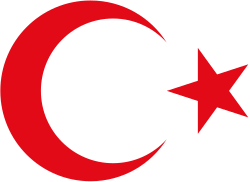Turks of the Dodecanese
The Turks of the Dodecanese are a community of 5,500[1] Turkish-speaking people and ethnic Turks as well as Greek Muslims from Crete and the Dodecanese whose ancestors converted to Islam in the Ottoman period. They live on the Dodecanese islands of Rhodes (Turkish: Rodos) and Kos (Turkish: İstanköy), since they were not affected by the 1923 population exchange between Greece and Turkey because the Dodecanese islands were under the rule of the Kingdom of Italy at the time (from 1912). All inhabitants of the islands became Greek citizens after 1947 when the islands became part of Greece.

| Part of a series of articles on |
| Turkish people |
|---|
 |
|
|
|
As a result of this incorporation into Greece and due to the situation following the Cyprus conflict and the Turkish invasion of Cyprus in 1974 many Muslim Turks left the islands and settled in Turkey.[2] Many of them were deprived of their Greek citizenship and property.[2] Some of those who stayed abandoned the Turkish language and their religion.[2]
The Turks in Kos are partly organized around the Muslim Association of Kos Kos Müslüman which gives the figure 2,000 for the population they bring together and represent for the Greek island.[3]
Those in Rhodes are organized around the Moslem Association of Rhodes Rodos Müslümanı, which gives the figure 3,500 for the population they bring together and represent for the island.[4]
The more general term Adali is sometimes used (meaning "islanders").
The president of their association Mazlum Paizanoglou estimates the number in Rhodes as 2500 and in Kos as 2000.[5]
See also
References
- Clogg 2002, 84.
- http://www.helsinki.fi/slavicahelsingiensia/preview/sh41/pdf/3.pdf
- News article on the publication of the constitutive article for the Turkish Muslim Association of Kos in the Greek Official Gazette (in Turkish) Archived July 8, 2004, at the Wayback Machine
- "Rodos'ta misket havası çaldı - Güncel Haberler". Milliyet.
- "İstanköy'de ilk Türk derneği". arsiv.ntv.com.tr.
Bibliography
- Clogg, Richard (2002), Minorities in Greece, Hurst & Co. Publishers, ISBN 1-85065-706-8.
